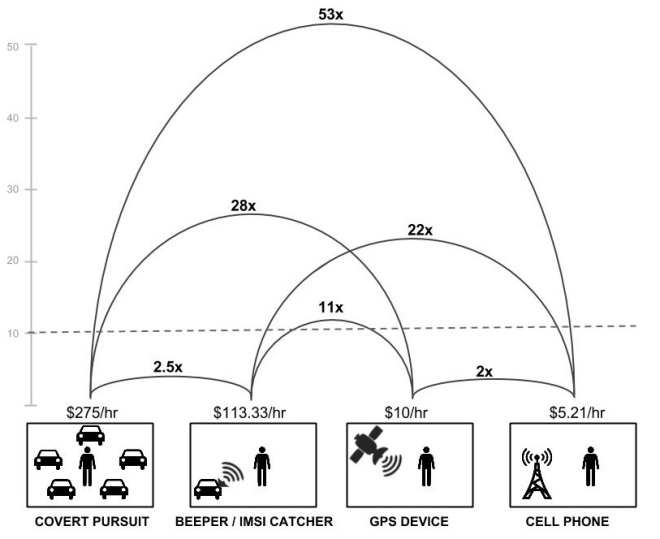
Graph showing the difference in hourly cost between various location tracking techniques.
The Yale Law Journal Online (YLJO) just published an article that I co-authored with Kevin Bankston (first workshopped at the Privacy Law Scholars Conference last year) entitled “Tiny Constables and the Cost of Surveillance: Making Cents Out of United States v. Jones.” In it, we discuss the drastic reduction in the cost of tracking an individual’s location and show how technology has greatly reduced the barriers to performing surveillance. We estimate the hourly cost of location tracking techniques used in landmark Supreme Court cases Jones, Karo, and Knotts and use the opinions issued in those cases to propose an objective metric: if the cost of the surveillance using the new technique is an order of magnitude (ten times) less than the cost of the surveillance without using the new technique, then the new technique violates a reasonable expectation of privacy. For example, the graph above shows that tracking a suspect using a GPS device is 28 times cheaper than assigning officers to follow him.
The paper was inspired by an exchange between Catherine Crump and Representative Gowdy at a congressional hearing two years ago on the “Geolocational Privacy and Surveillance Act.” The congressman asked how tracking technology, specifically GPS tracking, is any different from following someone around on the street and whether it merits additional legal protections. We relied on Harry Surden‘s eloquent argument that privacy protections are often made possible due to structural transaction costs and Orin Kerr who argues that the Supreme Court should use an equilibrium-adjustment theory to maintain a steady level of protection in the face of new technologies.
If technical and financial barriers previously provided some protection from large-scale surveillance by the government, these implicit protections have been essentially eliminated by the low costs of new surveillance technology. Once the cost approaches zero, we will be left with only outdated laws as the limiting function.
You can read the full article or download the PDF.
Additionally, our research has been covered by several media outlets:
Forbes: Cell Phones Let Cops Track People for a Thousandth of the Price, Study Finds
SF Gate: The staggeringly cheap costs of monitoring you with a cell phone
CNet: How the cost of cell phone surveillance can change legal privacy protections
Business Insider: How Easy It Is To Spy These Days, In One Graphic
The Verge: Cellphone surveillance costs $5 per hour, according to report
Information Week: Surveillance: Fast, Cheap, And Out Of Control
Digital Trends: Cell Phone Tracking Costs As Little As $0.04 An Hour, Say Privacy Researchers
Examiner: Cost of tracking suspects by GPS so low that legal questions are raised: Study
Co.Exist: How Cheap It Is To Spy On You, In One Infographic
